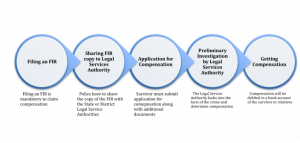[Trigger Warning: The following content contains information on physical violence which some readers may find disturbing.]
To seek compensation under the Victims Compensation Scheme,(( Compensation Scheme for Women Victims/Survivors of Sexual Assault/other Crimes 2018, National Legal Services Authority, accessed at https://wcd.nic.in/sites/default/files/Final%20VC%20Sheme_0.pdf.)) the procedure is:

Step 1: Filing an FIR
The survivor or someone on their behalf has to mandatorily report the acid attack crime by filing an FIR.
Step 2: Sharing FIR copy to Legal Services Authority
The station house officer (“SHO”), Superintendent of Police (“SP”) or the Deputy Commissioner of Police (“DCP”) of a police station has to mandatorily share a hard or soft copy of the FIR with the SLSA or DLSA.
Step 3: Application for compensation
The survivor, her dependents or relatives, or the SHO of the area concerned to the SLSA or DLSA can file an application for the award of an interim or final award of compensation. The application must be submitted in the format given under the Victim Compensation Scheme as Form -I. It must be filed with a copy of the FIR or criminal complaint and, if available, a Medical Report or Death Certificate. Further, the applicant must submit a copy of the judgement/ recommendations of the court, if the trial is over.
Step 4: Preliminary Investigation by Legal Services Authority
The SLSA or DLSA then begins the preliminary verification of the facts of the attack for granting compensation.
Step 5: Getting Compensation
The amount of compensation will be given by the SLSA or DLSA by depositing it in a Bank in the joint or single name of the survivor or dependent(s). In case the survivor does not have any bank account, the DLSA would facilitate opening of a bank account in the name of the survivor. In case the survivor is a minor in a child care institution, the bank account will be opened with the Superintendent of the institution as Guardian. However, in case the survivor is a foreign national or a refugee, the compensation will be given through cash cards.
To learn more on information on schemes in different states for survivors of violence, contact details of one-stop centres, protection officers and helpline numbers, check out the Nyaaya Map on Key Information for Survivors of Violence.
